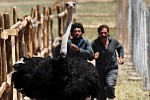 Shadows off the beaten path
Shadows off the beaten path< < F O R E I G N > >
last update 29.Jun.08
See also: SHADOWS FILM FESTIVAL
 R E V I E W B Y R I C H C L I N E
R E V I E W B Y R I C H C L I N E La Graine et le Mulet
La Graine et le Mulet
with Habib Boufares, Hafsia Herzi, Bouraouia Marzouk, Hatika Karaoui, Farida Benkhetache, Abdelhamid Aktouche, Alice Houri, Sami Zitouni, Mohamed Benabdeslem, Leila D'Issernio, Sabrina Ouazani, Jeanne Corporon
 release Fr 12.Dec.07,
release Fr 12.Dec.07, UK 20.Jun.08,
US 25.Dec.08
07/France Pathe 2h34
VENICE FILM FEST
 Beautifully and realistically shot and acted, this riveting family melodrama has a lot to say about the social structure of France, and most of the Western world for that matter. Especially the treatment of immigrant communities.
Beautifully and realistically shot and acted, this riveting family melodrama has a lot to say about the social structure of France, and most of the Western world for that matter. Especially the treatment of immigrant communities.
Slimane (Boufares) is a North African who has worked in the shipyards at Sete, France, for 35 years but has just had his hours cut in half. So he decides to go after a dream to open a restaurant on a derelict boat. But the local officials give him the run-around for permits and funding. And even more dangerous is the fact that the menu specialty is the fish couscous recipe of his spirited ex-wife (Marzouk), mother of his sprawling and feisty family. His hotel-owner girlfriend Latifa (Karaoui) isn't happy about this.
The story builds to an opening night banquet where Slimane plans to impress the locals, but filmmaker Kechiche continually suggests ways in which everything can go horribly wrong as characters spark off each other in ways that are often hilariously jagged, churning up attitudes that are racist and sexist, plus some good old-fashioned jealousy. And really, this is a film about these themes and attitudes.
The story is told in a style that's both jerky and meandering; some scenes feel draggy and unnecessarily long, especially when there are 20 people on screen all talking at the same time, while other key plot moments are missing altogether. As a result, the film seems in dire need of severe editing. But this isn't a film about story and plot; it's an astute examination of complex issues such as immigration, family ties and cultural cohesion.
Kechiche films scenes with a documentary-like authenticity that's augmented by pure performances from the large cast. Every character's personal story is sharply highlighted in ways that are both funny and emotionally wrenching, and the film's most powerful relationship is between Slimane and Latifa's daughter (Herzi), who he treats with the same respect and love he offers his own children and grandchildren. In other words, besides being a remarkable, evocative look at modern society, this is also a moving portrait of a kind, self-reliant man at the mercy of everyone around him.
14.Jun.08
 R E V I E W B Y R I C H C L I N E
R E V I E W B Y R I C H C L I N E Tropa de Elite
Tropa de Elite
scr José Padilha, Rodrigo Pimentel, Bráulio Mantovani
with Wagner Moura, Caio Junqueira, André Ramiro, Maria Ribeiro, Fernanda Machado, Fernanda de Freitas, Paulo Vilela, Milhem Cortaz, Fábio Lago, André Santinho, Marcelo Valle, Emerson Gomes
 release Br 5.Oct.07,
release Br 5.Oct.07, US 25.Jan.08,
UK 8.Aug.08
07/Brazil Universal 1h58
Golden Bear:
BERLIN FILM FEST

 Muscly and vicious, this Brazilian drama looks at life in Rio's favelas from the cop's perspective for a change. The moral dilemmas are gripping, but the film takes itself far too seriously to ever connect with us.
Muscly and vicious, this Brazilian drama looks at life in Rio's favelas from the cop's perspective for a change. The moral dilemmas are gripping, but the film takes itself far too seriously to ever connect with us.
It's 1997, and Nascimiento (Moura) is a captain in the elite BOPE unit, which responds to gang violence with heavy force. He has agreed with his pregnant wife (Ribeiro) that he'll leave the job, but first he has to choose his successor: impulsive Neto (Junqueira) or meticulous Matias (Ramiro). Meanwhile, the team is trying to clean up the favela before a visit from the Pope. But corruption among the cops and violence on all sides threaten every hope of peace.
Padilha (Bus 174) certainly has an eye for the raw, gritty side of life. The camera almost wallows in the underbelly--both the frenetic pace of the favela and the darkness in the souls of the cops. Even the charity workers are caught up in a life of drugs and lawlessness; the must befriend the dealers who make their presence in the favelas possible. In other words, there isn't a single good guy here.
The cast is excellent, throwing themselves fully into their roles. But there's not a single character we sympathise with in any way. Even the cops who have the right motives are willing to indulge in a bit of torture and murder to get answers. The most thoughtful character, Matias, is lying to everyone (including himself), saying he's just a law student. And even Nascimiento's wife is unable to understand what's going on with her husband.
It's these internal moral struggles that keep us interested, hoping someone does the right thing for a change. Because in this environment, being worthy means having no conscience. But Padilha continually rubs us the wrong way with the testosterone-fuelled narration, exaggerated machismo and dialog shouted at full volume. In the end, he achieves a sort of mythical ultra-violent sensibility, especially as the officers delude themselves that they're serving their society. But we know that old truths trump vain vengeance every time: Those who live by the sword will die by it.
21.May.08
 R E V I E W B Y R I C H C L I N E
R E V I E W B Y R I C H C L I N E Les Femmes de l’Ombre
Les Femmes de l’Ombre
scr Jean-Paul Salomé, Laurent Vachaud
with Sophie Marceau, Julie Depardieu, Marie Gillain, Déborah François, Maya Sansa, Moritz Bleibtreu, Julien Boisselier, Vincent Rottiers, Volker Bruch, Robin Renucci, Xavier Beauvois, Colin David Reese
 release Fr 5.Mar.08,
release Fr 5.Mar.08, UK 27.Jun.08,
US Jun.08 siff
08/France Canal+ 2h00
 A strongly engaging story and a retro filmmaking style make this wartime thriller much more entertaining than expected. And it also helps highlight a long-overlooked side of the resistance.
A strongly engaging story and a retro filmmaking style make this wartime thriller much more entertaining than expected. And it also helps highlight a long-overlooked side of the resistance.
After her husband dies in 1944 Paris, Louise (Marceau) flees to London, where her brother Pierre (Boisselier) is working with the SOE, Britain's Special Operations Executive, aiding the French resistance. They need female agents for a vital mission, so Louise and Pierre gather together three "experienced" women (Depardieu, Gillain and François) and head for Normandy to join a fifth (Sansa) in their efforts to stop a German colonel (Bleibtreu) from informing Berlin of the Allies' D-Day plans. The clock is ticking, and these women are going to have to be creative. And very brave.
Filmmaker Salomé shoots and edits this like a 1940s noir thriller, with carefully orchestrated scenes that never rush to the point, building suspense gradually and anchoring everything in the solid characters. Each of the women emerges from their detailed back-stories to play a vital role in the overall plot. Most memorable is Depardieu's surprisingly tough ex-stripper, accompanied by Gillain as a conflicted beauty with a chequered past and François' explosives expert bombshell.
These are complex and intriguing performances as seriously feisty women, and they're ably held together by Marceau's pivotal central role, plus a cleverly subversive turn by Bleibtreu, who refuses to make his Nazi officer a pure movie villain. By creating such vivid and involving characters, we are completely drawn into the tense action. We don't even mind the slightly wordy script.
An attention to detail also adds depth to the usual spy-movie set-pieces, which are charged with emotion and intensity. Highlights include a cat-and-mouse sequence on the Paris Metro, which works on several levels literally and figuratively, and some extremely nasty scenes in a Nazi interrogation room. As things get increasingly messy for these women, it's great to see them continually pull realistic aces out of their sleeves. And even if it gets a bit sentimental and tidy in the end, this almost feels like a relief after the thrilling ordeal we've just witnessed.
10.Apr.08
 R E V I E W B Y R I C H C L I N E
R E V I E W B Y R I C H C L I N E MUST
MUST  SEE
SEE
scr Mehran Kashani, Majid Majidi
with Reza Naji, Maryam Akbari, Kamran Dehghan, Hamed Aghazi, Shabnam Aklaghi, Neshat Nazari
 release UK Jun.08 eiff,
release UK Jun.08 eiff, US 27.Mar.09
08/Iran 1h36
BERLIN FILM FEST

 With this simple story of real-life comedy and drama, plus those small moral decisions we face every day, Majidi gives us a warmly involving and entertaining look at the earthy humanity of life in Iran.
With this simple story of real-life comedy and drama, plus those small moral decisions we face every day, Majidi gives us a warmly involving and entertaining look at the earthy humanity of life in Iran.
Karim (Naji) works in an ostrich farm in the countryside outside Tehran, but is sacked when one of the birds escapes. And it couldn't happen at a worse time, as his eldest daughter is in need of a new hearing aid. He heads into the city to see what he can do about it, and is mistaken for a motorbike cabbie, which he decides is as good a way of earning a living as any. But his urban passengers ignite his materialistic urges, which worries his wife (Akbari).
Majidi (The Colour of Paradise) uses sharp editing to make the most of Tooraj Mansoouri's elegant cinematography and highlight the lively characters created by a non-professional cast of actors. The children are especially engaging, as they're constantly up to something, usually to Karim's annoyance. Akbari is superb as the film's voice of reason, but this is Karim's story, and Naji creates a vivid spark of a man who's curious, interested, greedy and fully aware when he crosses the line.
Essentially, the film is a contrast of three cultures: the man trying to support his family and make an honest living, the modern society around him tempting him to break the rules, and the neighbourhood children, also up to all manner of mischief, but in a way that's innocent and naive. And perhaps a fourth strand would be the escaped ostrich, who makes a run for freedom (followed hopelessly by Karim in ostrich-garb) and then mysteriously lays eggs around the village.
Yes, these themes are not restricted to Iran. De Sica's Bicycle Thieves comes to mind while watching this story of someone who puts his hope into the things he has rather than the people around him. And Majidi also stirs in some karma, as minor moral infractions are generally met with cosmic revenge. The result is a film that's often very funny as well as quietly challenging. It's also packed with eye-catching images that will be impossible to forget, such as a convoy of motorbikes carrying large kitchen appliances or a heart-pounding sea of goldfish.
19.Jun.08 eiff


See also: SHADOWS FILM FESTIVAL
© 2008 by Rich Cline, Shadows
on the Wall